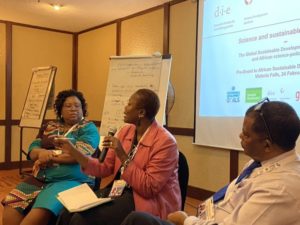
On 24 to 27 February 2020, the 6th African Regional Forum on Sustainable Development took place in Victoria Falls, Zimbabwe. In a workshop on „Science and sustainable development – the Global Sustainable Development Report (GSDR) and African science-policy-interface“, the German Dvelopment Institute / Deutsches Institut für Entwicklungspolitik (DIE), jointly with partner institutions and two co-authors of the GSDR, discussed African agency in science. Attended by around 50 researchers and policy-makers from across the African continent, the participants discussed key entry points for sustainability research in Africa.
Science networks were seen as crucial to generate evidence, strengthen capacities and inform policies. These networks could be formal global structures, such as the World Meteorological Organisation (WMO), producing and exchanging data on climate change. Equally important are regional exchanges, such as the Network of African Science Academies (NASAC), or transnational cooperations such as the Afrobarometer in social sciences, exploring public opinion across African states. The workshop participants discussed themes for transnational research, exchanged on institutions and incentives for improving the science-policy-interface in Africa and looked at good practice in international science cooperation, amongst which featured the German Academic Exchange Service / Deutscher Akademischer Austauschdienst (DAAD).
Participants attributed importance to national African funding for science, as well as an ethos of researchers to “give back to society“. Publically funded researchers would have to justify how they contribute to sustainable development, and should see it as their task to engage with policy-makers and the public on the relevant findings of their research, the group argued. Additionally, policy makers were called to rethink curricula for schools and higher education institutions. Researchers, for their part, saw the need to be considered equal partners in joint international research, as the often suggested role of mere data-collectors had little effect on capacities across the continent.
Schreibe einen Kommentar